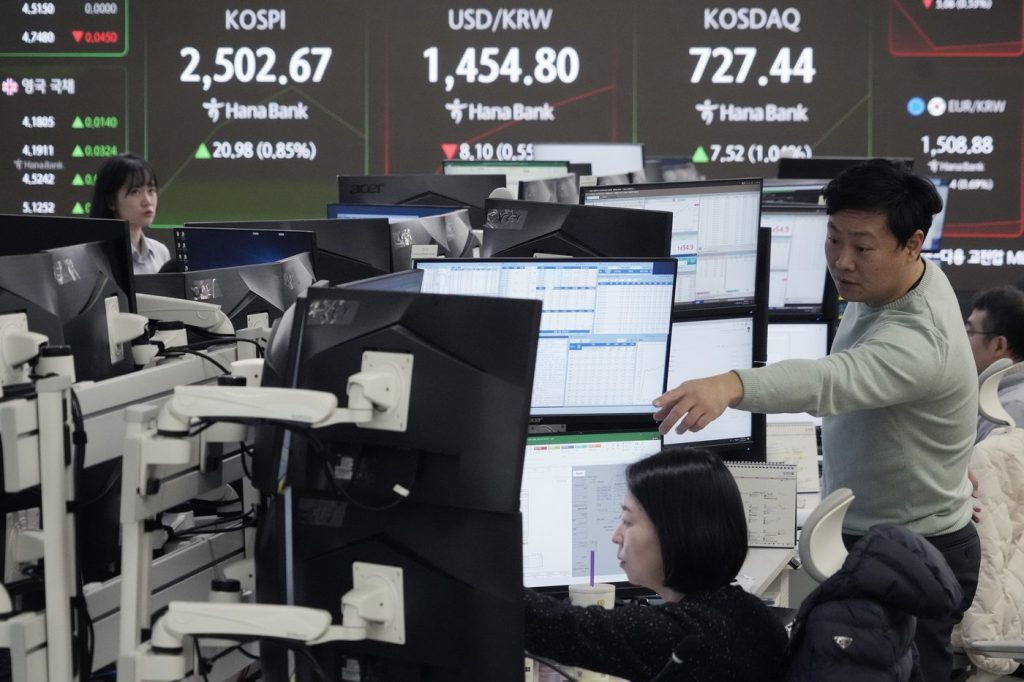TOKYO (AP) - Asian shares mostly declined on Wednesday as investors assessed the ramifications of tariffs imposed by the United States and China. The trading environment was influenced by evolving trade tensions, primarily stemming from President Donald Trump's tariffs targeting China.
In Japan, the benchmark Nikkei 225 index fell by 0.2% to close at 38,727.19. Meanwhile, Australia’s S&P/ASX 200 saw a slight increase of 0.5%, reaching 8,417.10. The Hang Seng index in Hong Kong dropped 0.6% to 20,659.41, while the Shanghai Composite index lost 0.3%, settling at 3,239.74. In South Korea, the Kospi index exhibited a positive movement, rising 1.1% to 2,508.58. Investors in South Korea appeared to find opportunities following recent stock price declines and expressed optimism following a rally in Wall Street the previous evening.
Analysts suggest that tariffs targeting China could be distinct from Trump’s actions against other trading partners. There is a belief that the Trump administration may maintain a longer-term stance on tariffs against China, mirroring strategies used in his first presidential term to further delineate the U.S. from its geopolitical rival.
Currently, Trump is moving forward with a 10% tariff on U.S. companies importing goods from China. In retaliation, China declared its own tariffs on certain U.S. products and initiated an antitrust investigation into Google. China's tariffs include a 15% levy on U.S. coal and liquefied natural gas, alongside a 10% tariff on crude oil, agricultural machinery, and large-engine cars. These tariffs are set to take effect on Monday, allowing for potential negotiations between Trump and Chinese President Xi Jinping.
Stephen Innes, managing partner at SPI Asset Management, commented on the situation, stating that while trade tensions have not escalated into full-blown conflict, they are "simmering dangerously close to a full boil." He advised that underestimating the risks involved could have serious implications.
On Wall Street, a sense of stability returned as technology stocks led a rebound in U.S. indexes, benefiting from a positive earnings report from Palantir Technologies, a company capitalizing on the artificial intelligence boom. Consequently, the S&P 500 increased by 0.7% after previously experiencing sharp volatility amid concerns that Trump's tariffs could ignite a global trade war detrimental to numerous economies.
The Dow Jones Industrial Average saw an increase of 134 points, or 0.3%, while the Nasdaq composite grew by 1.4%. Furthermore, on Monday, Trump reached an agreement to delay tariff implementation on imports from Canada and Mexico for an additional month. This move bolstered Wall Street's long-held belief that Trump's aggressive tariff rhetoric might merely serve as a negotiation strategy rather than a definitive long-term policy.
Despite the optimistic market sentiment, some analysts warn that trade war scenarios remain plausible, suggesting that Trump's threats should be taken at face value. Mark Cabana of Bank of America highlighted the close correlation between the equity markets and the administration's policies, advising investors to tread carefully given the risks of potential adverse impacts on market stability.
In the tech sector, shares of Alphabet, Google’s parent company, rose by 2.5%, unhindered by the ongoing antitrust investigation from China. Conversely, pharmaceutical giant Merck's stock plummeted by 9.1% despite surpassing sales and profit forecasts for the recent quarter, attributed in part to a revenue outlook that disappointed analysts, notably due to a halt in shipments of one of its leading products to China.
Overall, the S&P 500 added 43.31 points to reach 6,037.88, while the Dow Jones Industrial Average rose by 134.13 points, hitting 44,556.04, and the Nasdaq composite increased by 262.06 points, reaching 19,654.02.
In the bond market, Treasury yields eased following a report indicating that the job market may be exerting less upward pressure on inflation. The yield on the 10-year Treasury bond decreased to 4.51% from 4.56%, while the two-year yield, which reflects Federal Reserve expectations regarding short-term interest rates, fell to 4.21% from 4.25%.
In energy markets, benchmark U.S. crude oil fell by 20 cents to $72.50 a barrel, whereas Brent crude, the international benchmark, decreased by 31 cents to $75.89 per barrel. Currency trading showed the U.S. dollar slipping to 153.41 Japanese yen from 154.30 yen. The euro marginally appreciated to $1.0386, up from $1.0382.










